汉英古文翻译参考
中国文言文外文翻译

天地之间,物各有主。
山川草木,鸟兽昆虫,皆禀天地之气,受日月之光。
人者,天地之心,万物之灵。
生而有欲,欲而求安,求安而思乐,乐而忘忧,忘忧而志向远大。
是以圣人无常师,取法乎上,只以民心为本。
法者,所以正天下之纪纲;民心者,所以系天下之安危。
是以圣人无常师,取法乎上,只以民心为本。
【译文】In the expanse of the universe, every object has its own master. Mountains, rivers, trees, grass, birds, beasts, insects, all receive the breath of the heavens and earth, and are illuminated by the light of the sun and the moon. Humans, as the heart of the heavens and earth, thespirit of all things, are born with desires. Seeking satisfaction, they strive for peace; seeking peace, they seek happiness; finding happiness, they forget their worries; forgetting their worries, they aspire togreat goals. Therefore, the wise have no permanent teacher, but learn from the highest, taking the people's hearts as their foundation. Thelaw is the means to uphold the world's order; the people's hearts arethe key to the world's safety and danger. Thus, the wise have no permanent teacher, but learn from the highest, taking the people'shearts as their foundation.【原文】夫君子之行,静以修身,俭以养德。
古文观止中英对照

古文观止是中国古代文学的经典之作,其中包含了许多优秀的古文作品。
在古文观止中,有许多经典英译版本,以下是其中一些较为常见的版本:版本一:译文一:The book of ancient writings is a collection of ancient literary masterpieces. Among them are many classic English versions, some of which are quite popular.版本二:译文二:Ancient prose classic, an anthology of classic English translations, is a classic collection of ancient Chinese prose works.译文三:Ancient Chinese Classic, which includes a variety of excellent ancient Chinese prose works, has been widely translated into English.以上译文仅供参考,具体译文可能会因翻译者的翻译方法和语境而有所不同。
此外,由于古文观止中包含了许多不同的古文作品,因此这些译文可能无法涵盖所有古文作品。
此外,对于古文观止中的一些经典英译,也有一些有趣的对比和对照。
例如,《岳阳楼记》中的“不以物喜,不以己悲”这句话,可以翻译为“Not pleased by external things, nor moved by selfish desires.”或者“Not delighted by external things, nor distressed by selfish desires.”两种译法都表达了作者豁达、淡泊名利的情怀。
再如,《醉翁亭记》中的“醉翁之意不在酒,在乎山水之间也”这句话,可以翻译为“The intention of the drunken recluse is not on the wine, but in the mountains and rivers and forests.”这种译法既保留了原文的意境,又符合英语的表达习惯。
古语名句文言文英语翻译

一、《论语·学而》原文:学而时习之,不亦说乎?有朋自远方来,不亦乐乎?人不知而不愠,不亦君子乎?翻译:To study and review what one has learned at the proper time, is not this a joy? To have friends coming from afar, is not this a delight? To be unoffended when others do not understand you, is not this the attribute of a gentleman?二、《论语·为政》原文:子曰:“政者,正也。
子帅以正,孰敢不正?”翻译:Confucius said, “The essence of politics is righteousness. If you lead with righteousness, who dares to be unrighteous?”三、《论语·八佾》原文:子曰:“八佾舞于庭,是可忍也,孰不可忍也?”翻译:Confucius said, “If the danc e of the eight-line formation can be tolerated in the courtyard, what cannot be tolerated?”四、《论语·里仁》原文:子曰:“富而可求也,虽执鞭之士,吾亦为之。
如不可求,从吾所好。
”翻译:Confucius said, “If wealth can be sought, even if one has to be a chariot driver, I would do it. If not, I will follow my own inclinations.”五、《论语·述而》原文:子曰:“三人行,必有我师焉。
经典中国古文汉英对译

但愿人长久,千里共婵娟。
We wish each other a long life so as to share the beauty of this graceful moonlight, even though miles apart.独在异乡为异客,每逢佳节倍思亲。
A lonely stranger in a strange land I am cast, I miss my family all the more on every festive day.大江东去,浪淘尽,千古风流人物。
The endless river eastward flows; with its huge waves are gone all those gallant heroes of bygone years.二人同心,其利断金。
If two people are of the same mind, their sharpness can cut through metal.富贵不能淫,贫贱不能移,威武不能曲,此之谓大丈夫。
It is a true great man whom no money and rank can confuse, no poverty and hardship can shake, and no power and force can suffocate.海内存知己,天涯若比邻。
A bosom friend afar brings distance near.合抱之木,生于毫末,九层之台,起于累土;千里之行始于足下。
A huge tree that fills one’s arms grows from a tiny seedling; a nine-storied tower rises from a heap of earth; a thousand li journey starts with the first step.祸兮,福之所依;福兮,祸之所伏。
常用文言文英语翻译
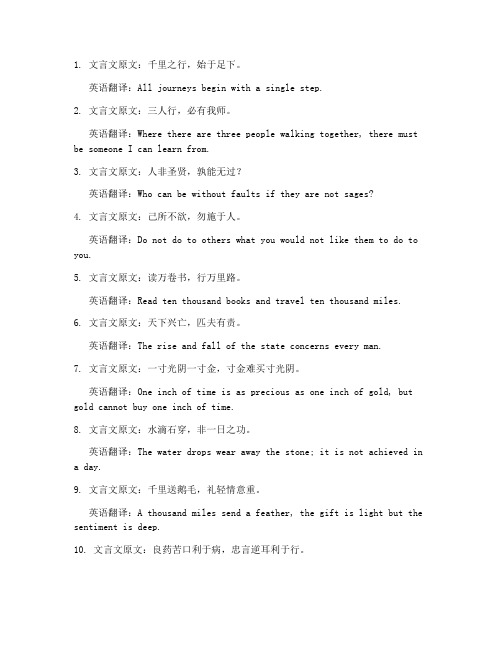
1. 文言文原文:千里之行,始于足下。
英语翻译:All journeys begin with a single step.2. 文言文原文:三人行,必有我师。
英语翻译:Where there are three people walking together, there must be someone I can learn from.3. 文言文原文:人非圣贤,孰能无过?英语翻译:Who can be without faults if they are not sages?4. 文言文原文:己所不欲,勿施于人。
英语翻译:Do not do to others what you would not like them to do to you.5. 文言文原文:读万卷书,行万里路。
英语翻译:Read ten thousand books and travel ten thousand miles.6. 文言文原文:天下兴亡,匹夫有责。
英语翻译:The rise and fall of the state concerns every man.7. 文言文原文:一寸光阴一寸金,寸金难买寸光阴。
英语翻译:One inch of time is as precious as one inch of gold, but gold cannot buy one inch of time.8. 文言文原文:水滴石穿,非一日之功。
英语翻译:The water drops wear away the stone; it is not achieved in a day.9. 文言文原文:千里送鹅毛,礼轻情意重。
英语翻译:A thousand miles send a feather, the gift is light but the sentiment is deep.10. 文言文原文:良药苦口利于病,忠言逆耳利于行。
文言文经典翻译英语
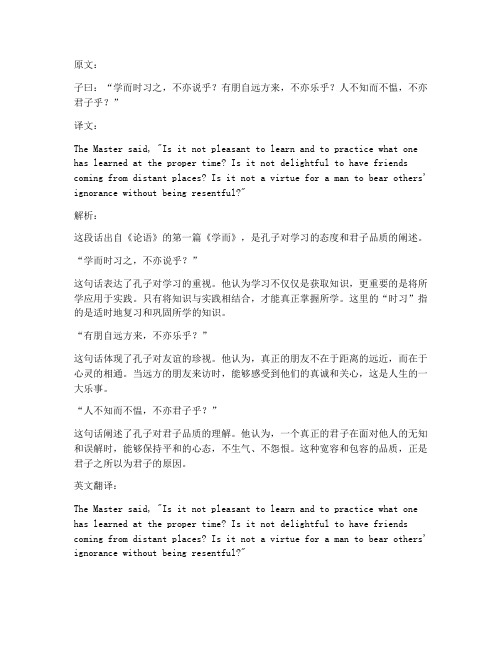
原文:子曰:“学而时习之,不亦说乎?有朋自远方来,不亦乐乎?人不知而不愠,不亦君子乎?”译文:The Master said, "Is it not pleasant to learn and to practice what one has learned at the proper time? Is it not delightful to have friends coming from distant places? Is it not a virtue for a man to bear others' ignorance without being resentful?"解析:这段话出自《论语》的第一篇《学而》,是孔子对学习的态度和君子品质的阐述。
“学而时习之,不亦说乎?”这句话表达了孔子对学习的重视。
他认为学习不仅仅是获取知识,更重要的是将所学应用于实践。
只有将知识与实践相结合,才能真正掌握所学。
这里的“时习”指的是适时地复习和巩固所学的知识。
“有朋自远方来,不亦乐乎?”这句话体现了孔子对友谊的珍视。
他认为,真正的朋友不在于距离的远近,而在于心灵的相通。
当远方的朋友来访时,能够感受到他们的真诚和关心,这是人生的一大乐事。
“人不知而不愠,不亦君子乎?”这句话阐述了孔子对君子品质的理解。
他认为,一个真正的君子在面对他人的无知和误解时,能够保持平和的心态,不生气、不怨恨。
这种宽容和包容的品质,正是君子之所以为君子的原因。
英文翻译:The Master said, "Is it not pleasant to learn and to practice what one has learned at the proper time? Is it not delightful to have friends coming from distant places? Is it not a virtue for a man to bear others' ignorance without being resentful?"This passage from the first chapter of the Analects reflects Confucius' attitude towards learning and the virtues of a gentleman."To learn and to practice what one has learned at the proper time, is it not pleasant?" This sentence emphasizes Confucius' importance of learning. He believed that learning is not only about acquiring knowledge but also about applying it in practice. Only by combining knowledge with practice can one truly master what has been learned. The phrase "to practice at the proper time" refers to reviewing and consolidating the knowledge learned at the right moment."To have friends coming from distant places, is it not delightful?" This sentence reflects Confucius' appreciation for friendship. He believed that true friends are not defined by distance but by the connection of their hearts. When friends from afar visit, one can feel their sincerity and concern, which is a great joy in life."To bear others' ignorance without being resentful, is it not a virtue for a gentleman?" This sentence elaborates on Confucius' understanding of a gentleman's character. He believed that a true gentleman can maintain a peaceful demeanor when facing others' ignorance and misunderstandings, without being angry or resentful. This virtue of tolerance and包容 is what makes a gentleman a gentleman.。
考博汉英翻译
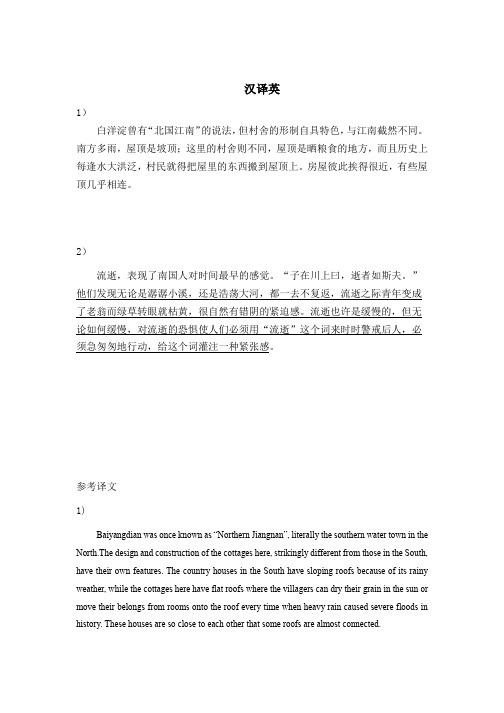
汉译英1)白洋淀曾有“北国江南”的说法,但村舍的形制自具特色,与江南截然不同。
南方多雨,屋顶是坡顶;这里的村舍则不同,屋顶是晒粮食的地方,而且历史上每逢水大洪泛,村民就得把屋里的东西搬到屋顶上。
房屋彼此挨得很近,有些屋顶几乎相连。
2)流逝,表现了南国人对时间最早的感觉。
“子在川上曰,逝者如斯夫。
”他们发现无论是潺潺小溪,还是浩荡大河,都一去不复返,流逝之际青年变成了老翁而绿草转眼就枯黄,很自然有错阴的紧迫感。
流逝也许是缓慢的,但无论如何缓慢,对流逝的恐惧使人们必须用“流逝”这个词来时时警戒后人,必须急匆匆地行动,给这个词灌注一种紧张感。
参考译文1)Baiyangdian was once known as “Northern Jiangnan”, literally the southern water town in the North.The design and construction of the cottages here, strikingly different from those in the South, have their own features. The country houses in the South have sloping roofs because of its rainy weather, while the cottages here have flat roofs where the villagers can dry their grain in the sun or move their belongs from rooms onto the roof every time when heavy rain caused severe floods in history. These houses are so close to each other that some roofs are almost connected.They realized that both the babbling brook and the mighty river would flow on, and that their waters would never return. They found that as time passed by, young men would become old and the green grass would turn yellow and wither in almost the blink of an eye. A sense of urgency naturally arose over the elusiveness of time. No matter how slowly time flowed, the very fear of its transiency compelled people to use the word “passage”to warn the coming generations of the necessity of taking prompt action; thus instilling the word with a sense of tension.。
专八汉英段落翻译

一座大厦如果有了白蚁,不加防治,不到十 一座大厦如果有了白蚁,不加防治, 年时间, 壁板,都会蛀蚀一空。 年时间,里面的地板 、壁板,都会蛀蚀一空。
• 地板: wooden floor • • 壁板: wall paneling • • 蛀蚀: bore, worm-eaten; moth-eaten; eat away, damage • • 一空: 一点不剩 nothing is left; …to nothing ; with nothing left; eat away all… • 参考译文 • If a tall building were infested with termites and nothing were done to prevent and control them, the entire wooden floor and wall paneling inside it would have been eaten away in less than ten years.
• • • • •
白蛇精与一位书生相爱并生一子。 与……相爱: fall in love with 书生: intellectual; scholar 生:生育 give birth to White Snake fell in love with a young scholar, married him and gave birth to a son.
至此,白蛇精与丈夫、儿子又得团 聚。
• 至此: up to now; so far; by now • 团聚: 聚会gather; 人或物在分离后 重聚 reunite • 得(以):so that…may (can)…be able to;so as to; • By now White Snake was able to reunite with /join her husband and son/her family.
双语文言文翻译

天地者,万物之逆旅也;光阴者,百代之过客也。
而浮生若梦,为欢几何?古人秉烛夜游,良有以也。
况阳春召我以烟景,大块假我以文章。
会桃花之芳园,序天伦之乐事。
群季俊秀,皆为惠连;吾人咏歌,独惭康乐。
幽赏未已,高谈阔论,引以为流觞曲水。
列坐其次,觞酌交错,起坐而喧哗者,众宾欢也。
【译文】The heavens and the earth are the waystation for all things; time is the passing guest of all generations. And life is as fleeting as a dream, so how much joy can we derive from it? The ancients held their lanterns and wandered at night, for there was indeed a reason for it. Moreover, the springtime invites me with its misty scenery, and the vast world lends me its artistic expressions. Gathering at the fragrant garden of peach blossoms, we celebrate the joy of family gatherings. Our youngerbrothers are all talented, akin to the ancient poet Huai Nan Zi; our songs and poems, however, can only make us feel ashamed in comparison. The serene appreciation is not yet over, and the high-spirited discussions have just begun. We use the flowing wine in the windingriver as a metaphor for our gatherings. We sit around, the cups of wine being passed around, and those who rise and sit and make a noise are the joyful guests.【原文】岂无山歌与村笛,呕哑嘲哳难为听。
中国古诗词英译50份
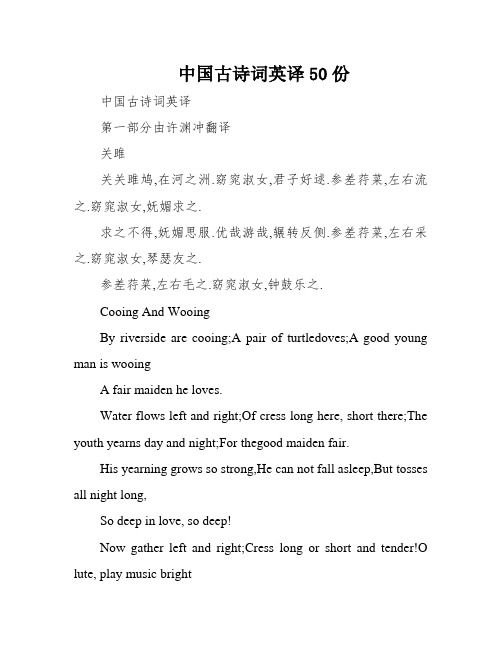
中国古诗词英译50份中国古诗词英译第一部分由许渊冲翻译关雎关关雎鸠,在河之洲.窈窕淑女,君子好逑.参差荇菜,左右流之.窈窕淑女,妩媚求之.求之不得,妩媚思服.优哉游哉,辗转反侧.参差荇菜,左右采之.窈窕淑女,琴瑟友之.参差荇菜,左右毛之.窈窕淑女,钟鼓乐之.Cooing And WooingBy riverside are cooing;A pair of turtledoves;A good young man is wooingA fair maiden he loves.Water flows left and right;Of cress long here, short there;The youth yearns day and night;For thegood maiden fair.His yearning grows so strong,He can not fall asleep,But tosses all night long,So deep in love, so deep!Now gather left and right;Cress long or short and tender!O lute, play music brightFor the bride sweet and slender!Feast friends at left and right;On cress cooked till tender!O bells and drums, delightThe bride so sweet and slender!大风歌刘邦大风起兮云飞扬,加海内兮归故乡。
安得猛士兮守四方!SONG OF THE GREAT WINDA great wind rises, oh! The clouds are driven away.I come to my native land, oh! Now the world is under my sway.Where can I brave men, oh! To guard my four frontiers today!垓下歌项羽力拔山兮气盖世,时不力兮驹不逝。
优秀的文言文翻译英语
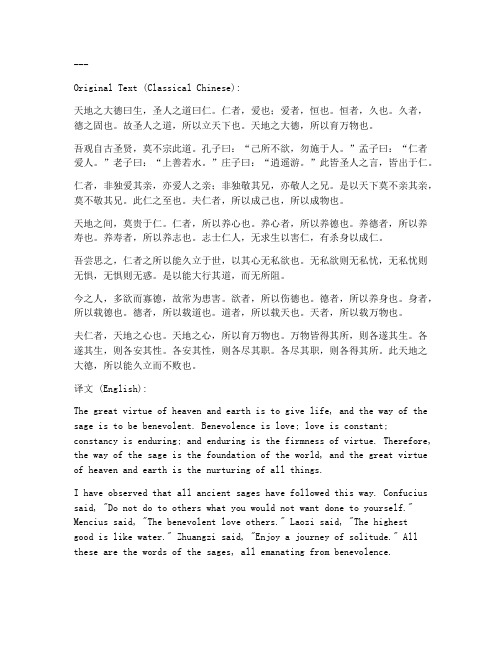
---Original Text (Classical Chinese):天地之大德曰生,圣人之道曰仁。
仁者,爱也;爱者,恒也。
恒者,久也。
久者,德之固也。
故圣人之道,所以立天下也。
天地之大德,所以育万物也。
吾观自古圣贤,莫不宗此道。
孔子曰:“己所不欲,勿施于人。
”孟子曰:“仁者爱人。
”老子曰:“上善若水。
”庄子曰:“逍遥游。
”此皆圣人之言,皆出于仁。
仁者,非独爱其亲,亦爱人之亲;非独敬其兄,亦敬人之兄。
是以天下莫不亲其亲,莫不敬其兄。
此仁之至也。
夫仁者,所以成己也,所以成物也。
天地之间,莫贵于仁。
仁者,所以养心也。
养心者,所以养德也。
养德者,所以养寿也。
养寿者,所以养志也。
志士仁人,无求生以害仁,有杀身以成仁。
吾尝思之,仁者之所以能久立于世,以其心无私欲也。
无私欲则无私忧,无私忧则无惧,无惧则无惑。
是以能大行其道,而无所阻。
今之人,多欲而寡德,故常为患害。
欲者,所以伤德也。
德者,所以养身也。
身者,所以载德也。
德者,所以载道也。
道者,所以载天也。
天者,所以载万物也。
夫仁者,天地之心也。
天地之心,所以育万物也。
万物皆得其所,则各遂其生。
各遂其生,则各安其性。
各安其性,则各尽其职。
各尽其职,则各得其所。
此天地之大德,所以能久立而不败也。
译文 (English):The great virtue of heaven and earth is to give life, and the way of the sage is to be benevolent. Benevolence is love; love is constant; constancy is enduring; and enduring is the firmness of virtue. Therefore, the way of the sage is the foundation of the world, and the great virtue of heaven and earth is the nurturing of all things.I have observed that all ancient sages have followed this way. Confucius said, "Do not do to others what you would not want done to yourself." Mencius said, "The benevolent love others." Laozi said, "The highest good is like water." Zhuangzi said, "Enjoy a journey of solitude." All these are the words of the sages, all emanating from benevolence.Benevolence is not only the love for one's own family, but also the love for the families of others; not only the respect for one's own brother, but also the respect for the brothers of others. Therefore, no one is not loving their own family, and no one is not respecting their own brother. This is the ultimate of benevolence. Benevolence is the way to cultivate oneself, and the way to cultivate all things.Between heaven and earth, nothing is more precious than benevolence. Benevolence is the way to nourish the heart; to nourish the heart is to nourish virtue; to nourish virtue is to nourish longevity; to nourish longevity is to nourish one's aspirations. The noble and benevolent do not seek to live at the expense of benevolence, but are willing to sacrifice their lives to achieve it.I have often thought about it, and the reason why benevolent people can。
古代文言文英语翻译
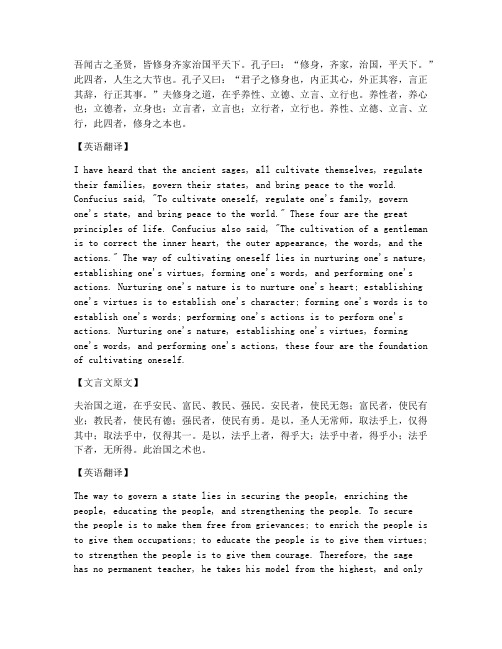
吾闻古之圣贤,皆修身齐家治国平天下。
孔子曰:“修身,齐家,治国,平天下。
”此四者,人生之大节也。
孔子又曰:“君子之修身也,内正其心,外正其容,言正其辞,行正其事。
”夫修身之道,在乎养性、立德、立言、立行也。
养性者,养心也;立德者,立身也;立言者,立言也;立行者,立行也。
养性、立德、立言、立行,此四者,修身之本也。
【英语翻译】I have heard that the ancient sages, all cultivate themselves, regulate their families, govern their states, and bring peace to the world. Confucius said, "To cultivate oneself, regulate one's family, governone's state, and bring peace to the world." These four are the great principles of life. Confucius also said, "The cultivation of a gentleman is to correct the inner heart, the outer appearance, the words, and the actions." The way of cultivating oneself lies in nurturing one's nature, establishing one's virtues, forming one's words, and performing one's actions. Nurturing one's nature is to nurture one's heart; establishing one's virtues is to establish one's character; forming one's words is to establish one's words; performing one's actions is to perform one's actions. Nurturing one's nature, establishing one's virtues, formingone's words, and performing one's actions, these four are the foundation of cultivating oneself.【文言文原文】夫治国之道,在乎安民、富民、教民、强民。
古诗句英汉互译(DOC)
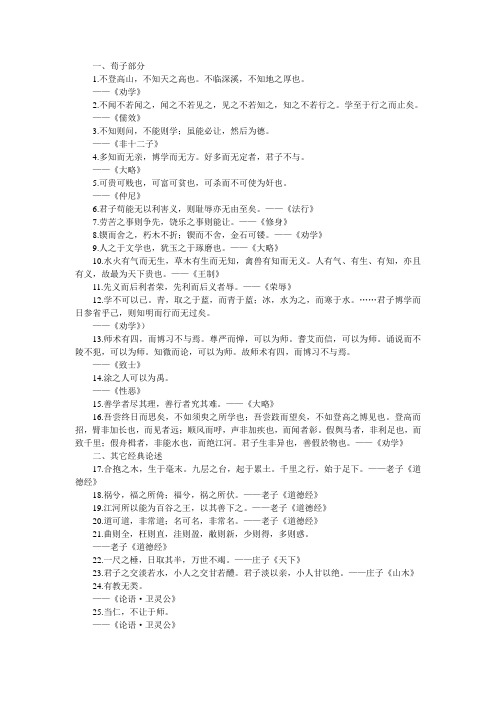
一、荀子部分1.不登高山,不知天之高也。
不临深溪,不知地之厚也。
——《劝学》2.不闻不若闻之,闻之不若见之,见之不若知之,知之不若行之。
学至于行之而止矣。
——《儒效》3.不知则问,不能则学;虽能必让,然后为德。
——《非十二子》4.多知而无亲,博学而无方。
好多而无定者,君子不与。
——《大略》5.可贵可贱也,可富可贫也,可杀而不可使为奸也。
——《仲尼》6.君子苟能无以利害义,则耻辱亦无由至矣。
——《法行》7.劳苦之事则争先,饶乐之事则能让。
——《修身》8.锲而舍之,朽木不折;锲而不舍,金石可镂。
——《劝学》9.人之于文学也,犹玉之于琢磨也。
——《大略》10.水火有气而无生,草木有生而无知,禽兽有知而无义。
人有气、有生、有知,亦且有义,故最为天下贵也。
——《王制》11.先义而后利者荣,先利而后义者辱。
——《荣辱》12.学不可以已。
青,取之于蓝,而青于蓝;冰,水为之,而寒于水。
……君子博学而日参省乎己,则知明而行而无过矣。
——《劝学》)13.师术有四,而博习不与焉。
尊严而惮,可以为师。
耆艾而信,可以为师。
诵说而不陵不犯,可以为师。
知微而论,可以为师。
故师术有四,而博习不与焉。
——《致士》14.涂之人可以为禹。
——《性恶》15.善学者尽其理,善行者究其难。
——《大略》16.吾尝终日而思矣,不如须臾之所学也;吾尝跂而望矣,不如登高之博见也。
登高而招,臂非加长也,而见者远;顺风而呼,声非加疾也,而闻者彰。
假舆马者,非利足也,而致千里;假舟楫者,非能水也,而绝江河。
君子生非异也,善假於物也。
——《劝学》二、其它经典论述17.合抱之木,生于毫末。
九层之台,起于累土。
千里之行,始于足下。
——老子《道德经》18.祸兮,福之所倚;福兮,祸之所伏。
——老子《道德经》19.江河所以能为百谷之王,以其善下之。
——老子《道德经》20.道可道,非常道;名可名,非常名。
——老子《道德经》21.曲则全,枉则直,洼则盈,敝则新,少则得,多则惑。
文言文外语翻译

古之避秦时乱,率妻子邑人来此绝境,不复出焉,遂与外人间隔。
问今是何世,乃不知有汉,无论魏、晋。
此人为具言其姓字、乡里、所从至者,问今是何代,具答之。
便要还家,设酒杀鸡作食。
村中闻有此人,咸来问讯。
自云先世避秦,率妻子邑人来此绝境,不复出焉,遂与外人间隔。
问今是何世,乃不知有汉,无论魏、晋。
此人一一为具言所闻,皆叹惋。
余人各复延至其家,皆出酒食。
停数日,辞去。
此中人语云:“不足为外人道也。
”既出,得其船,便扶向路,处处志之。
及郡下,诣太守,说如此。
太守即遣人随其往,寻向所志,遂迷,不复得路。
南阳刘子骥,高尚士也,闻之,欣然规往。
未果,寻病终,后遂无问津者。
向吾不为斯役,则久已病矣。
夫芸芸众生,皆为名利所困,何不归隐山林,求一清静之地,远离尘嚣,以终天年。
吾独何幸,得此桃花源,与世隔绝,如入仙境。
然此间乐,不若归家之乐也。
余以愚钝,不能如子骥之远行,故作此记,以述其事。
吾虽未能至,然心向往之。
愿得此良辰美景,与知己共赏,何其快哉!今译:古时候,有人为了避免秦朝的战乱,带领妻子、儿女和同乡们来到这个与世隔绝的地方,从此不再外出,与外界隔绝。
有人问现在是什么朝代,他们竟然不知道有汉朝,更不用说魏、晋两朝了。
这个人详细地告诉了他们自己的姓氏、籍贯和来此地的原因,问现在是什么时代,他一一作了回答。
于是,他们邀请他回家,摆酒杀鸡款待他。
村子里的人听说有这个人,都来打听消息。
他自称祖先为了躲避秦朝的战乱,带领妻子、儿女和同乡们来到这个与世隔绝的地方,从此不再外出,与外界隔绝。
他问现在是什么时代,他们竟然不知道有汉朝,更不用说魏、晋两朝了。
这个人一一详细地告诉了他们所听到的一切,大家都感叹不已。
其他人也纷纷邀请他到自己家中,拿出酒食款待他。
他在这里住了几天,然后告辞离去。
这里的人告诉他:“这里的情况不值得对外人说。
”他离开后,找到了自己的船,就顺着原来的路回去,一路上都在做标记。
到了郡城,他去找太守,说了这件事。
【专八】专八翻译练习 汉译英50篇与参考译文.

126专八翻译练习汉译英50篇及参考译文Translate the underlined part of the text into English.1.在兽类中我最爱虎,在虎的故事中我最爱下面的一个。
深山中有一所古庙,几个和尚在那里过着单调的修行生活。
同他们做朋友的,除了有时上山来的少数乡下人外,就是几只猛虎。
虎不惊扰僧人,却替他们守护庙宇。
作为报酬,和尚把一些可吃的东西放在庙门前。
每天傍晚,夕阳染红小半个天空,虎们成群地走到庙门口,吃了东西,跳跃而去。
庙门大开,僧人们安然在庙内做他们的日课,也没有谁出去看虎怎样吃东西,即使偶尔有一二和尚立在门前,虎们亦视为平常的事情,把他们看做熟人,不去惊动,却斯斯文文地吃完走开。
如果看不见僧人,虎就发出几声长啸,随着几阵风飞腾而去。
2.光绪二十六年,八国联军攻占北京。
慈禧太后弃城而走,一直逃到西安。
和谈开始后,她并未马上返回北京。
起初,外国列强的要求里面有一项是让慈禧太后退位,由光绪帝重新执掌朝廷。
不过,在与李鸿章多次会谈后,他们放弃了这一要求。
第二年正式签署和约,随后过了一个月慈禧才终于从西安动身。
她对外国人万分惧怕,正像她对国人无比傲慢一样。
她在河南停留了很长一段时间,到了保定又逗留多日,好不容易才回到北京。
据野史记载,在这漫长的旅途中还发生了一件趣事。
一位地方官员送给慈禧一只猴子,她颇为高兴,竟下旨给那只猴子穿黄马褂。
后来太监报告说,有的官员发出了“人不如猴”的感慨,慈禧这才发现自己的决定有些荒唐,于是又下旨给随行官员每人一件黄马褂。
得到这殊荣之后,大家真不知道该感谢慈禧还是感谢那只猴子。
3. 中国对香港的政策是“一国两制”,这个原则不仅对香港经济发展有利,而且和中国本身的利益也是一致的。
我们不想使香港政府在过渡时期无法正常行使其职能,恰恰相反,我们希望它能有效地管理香港的事务,中英联合声明和建造新机场的谅解备忘录就是最好的保证。
至于1997年以后的,全国人民大会已通过了《中华人民共和国香港特别行政区基本法》。
文言文英语直译翻译
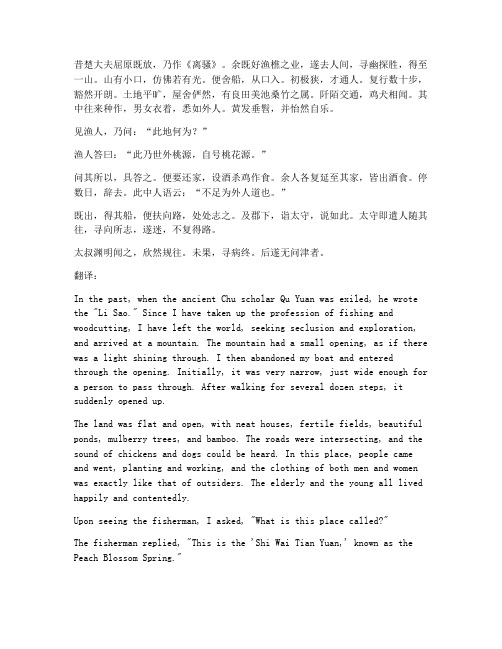
昔楚大夫屈原既放,乃作《离骚》。
余既好渔樵之业,遂去人间,寻幽探胜,得至一山。
山有小口,仿佛若有光。
便舍船,从口入。
初极狭,才通人。
复行数十步,豁然开朗。
土地平旷,屋舍俨然,有良田美池桑竹之属。
阡陌交通,鸡犬相闻。
其中往来种作,男女衣着,悉如外人。
黄发垂髫,并怡然自乐。
见渔人,乃问:“此地何为?”渔人答曰:“此乃世外桃源,自号桃花源。
”问其所以,具答之。
便要还家,设酒杀鸡作食。
余人各复延至其家,皆出酒食。
停数日,辞去。
此中人语云:“不足为外人道也。
”既出,得其船,便扶向路,处处志之。
及郡下,诣太守,说如此。
太守即遣人随其往,寻向所志,遂迷,不复得路。
太叔渊明闻之,欣然规往。
未果,寻病终。
后遂无问津者。
翻译:In the past, when the ancient Chu scholar Qu Yuan was exiled, he wrote the "Li Sao." Since I have taken up the profession of fishing and woodcutting, I have left the world, seeking seclusion and exploration, and arrived at a mountain. The mountain had a small opening, as if there was a light shining through. I then abandoned my boat and entered through the opening. Initially, it was very narrow, just wide enough for a person to pass through. After walking for several dozen steps, it suddenly opened up.The land was flat and open, with neat houses, fertile fields, beautiful ponds, mulberry trees, and bamboo. The roads were intersecting, and the sound of chickens and dogs could be heard. In this place, people came and went, planting and working, and the clothing of both men and women was exactly like that of outsiders. The elderly and the young all lived happily and contentedly.Upon seeing the fisherman, I asked, "What is this place called?"The fisherman replied, "This is the 'Shi Wai Tian Yuan,' known as the Peach Blossom Spring."I asked him the reason, and he answered thoroughly. I then asked him to return home with me, and he prepared wine and killed a chicken for a meal. The others also invited me to their homes, where they all brought out wine and food. After staying for several days, I took my leave. The people there said, "This is not something that should be told to outsiders."After leaving, I found my boat and followed the original path, marking it everywhere. When I reached the city, I went to the magistrate andtold him about it. The magistrate immediately sent someone to follow me, searching for the path I had marked, but they became lost and could no longer find the way.Tai Shu Yuanming heard about it and was eager to go there. However, he did not succeed and later died of illness. After that, there was no one who dared to inquire about it.。
各类文言文英语翻译

昔者孔子游于泰山之阳,见一小儿戏于庭。
孔子问之:“尔何戏也?”小儿对曰:“吾戏于鱼跃。
”孔子曰:“鱼跃何为?”小儿曰:“鱼跃于渊,乐也。
”孔子曰:“善哉!吾闻之,鱼跃于渊,其乐无穷。
今汝戏于此,岂不乐乎?”小儿笑而答曰:“然也,吾之乐亦无穷。
”【英语翻译】In ancient times, Confucius wandered in the sunny side of Mount Tai and saw a child playing in the courtyard. Confucius asked him, "What are you playing?" The child replied, "I am playing with the leaping fish." Confucius said, "What is the leaping of the fish for?" The child said, "The fish leap into the deep, and it is joyful." Confucius said, "How good! I have heard that when the fish leap into the deep, their joy is boundless. Now you are playing here, are you not joyful?" The child laughed and answered, "Indeed, my joy is also boundless."【文言文】楚人有鬻盾与矛者,誉之曰:“吾盾之坚,物莫能陷也。
”又誉其矛曰:“吾矛之利,于物无不陷也。
”或曰:“以子之矛陷子之盾,何如?”其人弗能应也。
- 1、下载文档前请自行甄别文档内容的完整性,平台不提供额外的编辑、内容补充、找答案等附加服务。
- 2、"仅部分预览"的文档,不可在线预览部分如存在完整性等问题,可反馈申请退款(可完整预览的文档不适用该条件!)。
- 3、如文档侵犯您的权益,请联系客服反馈,我们会尽快为您处理(人工客服工作时间:9:00-18:30)。
汉英古文翻译参考五柳先生传(注:2003年考题)先生不知何许人也,亦不详其姓字。
宅边有五柳树,因以为号焉。
闲静少言,不慕荣利。
好读书,不求甚解;每有会意,便欣然忘食。
性嗜酒,家贫而不能常得。
亲旧知其如此,或置酒而招之。
造饮辄尽,期在必醉;既醉而退,曾不吝请去留。
环睹萧然,不蔽风日。
短褐穿结,箪瓢屡空。
晏如也。
常著文章自娱。
颇示己志。
忘怀得失,以此自终。
《陶潜—陶渊明集》Mr. Five WillowsNo one knew where this gentleman came from and what his name was. There were five willows by his house; therefore he was named Mr. Five Willows. He was quiet and reserved, not envious of high position or great wealth. He enjoyed reading, but never tried hard to look for deeper meanings. Each time when he caught the point in a book, he would be in such high spirits that he would simply forget to have dinner. He was very fond of liquor but too poor to drink often. His old friends knew it, so they often invited him to have wine. He always drank to the bottom and got drunk. They he took his leave, and nobody minded.For his whole life, he dwelled in a humble house, had scanty clothing, and always lacked food, but he lived in peace. Sometimes he entertained himself by writing to show his ideals, and he never cared for gain or loss.苛政猛于虎(礼记工员檀弓)(注:2004年考题)孔子过泰山侧,有妇人哭于墓者而哀。
夫子式而听之。
使子路问之曰:“子之哭也,壹似重有忧者?”而曰:“然。
昔者吾舅死于虎,吾夫又死焉,今吾子又死焉。
”夫子曰:“何为不去也?”曰:“无苛政。
”夫子曰:“小子识之,苛政猛于虎也。
”(孔子有一次乘车经过泰山旁边,在那边有一位妇女在坟前哭而且哭得很悲恸。
孔子把手扶在车前横木上听她哭,派子路去问她说:“您的哭声听起来实在像有好几件伤心的事似的。
”那个女人就说:“您的话说对了。
从前我的公公死在老虎口中(被老虎咬死了),后来我的丈夫又死在老虎口中;现在我的儿子又死在老虎口中了。
”孔子说:“为什么不离开这儿呢?”女人说:“这儿没有暴虐的政治。
”孔子说:“弟子们记住这句话,暴虐的政治比老虎更凶猛可怕。
)THAN A TIGEROnce when Confucius was passing near the foot of Mount Tai in a chariot, there was a married woman weeping at a grave mound, and dolorously too. Confucius politely rested his hands on the front rail of the chariot and listened to her weeping. He sent his disciple Zilu, to search for inquiry by saying:” From the sound of your weeping, it seems that you indeed have many troubles.”Then the woman said:” It is true. My father-in-law died in a tiger‟s jaw; my husband also died there. Now, my son has also died there.” Confucius said,” Why do not you leave this place?” The woman said:” Here there is no harsh and oppressive government.” Confucius said,” Young men, take note of this: a tyrannic government is more ferocious and fearsome than even a tiger.”矛盾(韩非子难一)楚人有卖盾与矛者,誉之曰:“吾盾之坚,物莫能陷之。
”以誉其矛曰:“吾矛之利,于物无不陷也。
”或曰:“以子之矛陷子之盾,何如?”其人弗能应也。
夫不可陷之盾与无不陷之矛不可同世而立。
SPEARS AND SHIELDSThere was a man of the state of Ch u who sold shields and spears. He bragged about his shields saying:” My shields are so hard that nothing can pierce through them .”He also bragged about his spears saying:” My spears are so sharp that there is nothing they cannot pierce through.” Someone said:” What would happen if people were to use your spears to pierce through your shields?‟ That person could not answer. Now, shields that cannot be pierced through and spears that can pierced through anything cannot exist at the sane time.塞翁失马(淮南子人间)近塞上之人有善术者,马无故亡而入胡,人皆吊之。
其父曰:“此何遽不能为福乎?”居数月,其马将胡骏马而,人皆贺之。
其父曰?“此何遽不能为祸平?”家富良马,其子好骑,堕而折其骨,人皆吊之。
其父曰:“此何遽不能为福乎?”居一年,胡人大举入塞,丁壮者引弦而战。
近塞之人,死者十九,此(子)独以跛故,父子相保。
故福之为祸,祸之为福,化不可极,深不可测也。
( 靠近边界上的人里有个很会占卜的人,他的马无缘无故地逃跑进入胡人的领地去了,别人都来慰问他。
他的父亲说:“这件事怎么就不能变成福呢?”过了几个月,他的马带着胡人的好马回来了,别人来向他道贺。
他的父亲说:“这件事怎么就不能变成灾祸呢?”家里有很多马,他的儿子喜欢骑马,从马上摔下来,摔断了他的胯骨,别人者来慰问他。
他的父亲说:“这件事怎么说不能变成福呢?”过了一年,胡人大规模地侵入边界,成年的男人都拿起弓来去打仗。
靠近边界上的人,死掉的有十分之九,只有这个摔断胯骨的儿子因为瘸了的缘故,父亲跟儿子能平安地生活在一块儿。
所以福变成祸,祸变成福,变化得没法子研究到底,深得没法子测量啊。
)THE OLD MAN A T THE FRONTIER LOSES HIS HORSEAmong the people near the frontier, there was one skilled at prognostication. For no reason, his horse ran off into the territory of the barbarians; everyone consoled him. His father said:” As for this, why can‟t it become good fortune?” Aft er several months, his horse returned leading some good barbarian horses; everyone congratulated him. His father said,” As for this, why can‟t it turn out to be a cause of misfortune?” Since there were many good horses in the household, his son became fond of riding, fell off a horse, and broke his thigh bone; everyone consoled the son‟s father. His father said, “Perhaps this will soon turn out to be a blessing!” After a year, the barbarians entered the frontier in great numbers. All the adult males picked up their bows to go fight. Of the people near the frontier, nine out of ten died. Only because of this man‟s son‟s lameness, could father and son both be safe [secure]. Thus, as to how fortune becomes misfortune and misfortune becomes fortune, this transformation cannot be utterly known; its depth cannot be fathomed.守株待兔(韩非子五蠢)宋人有耕者,田中有株,兔走触株,折颈而死。
